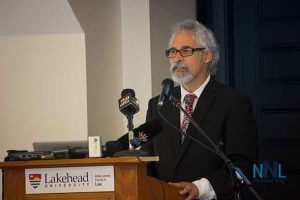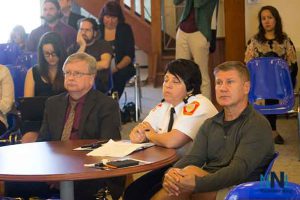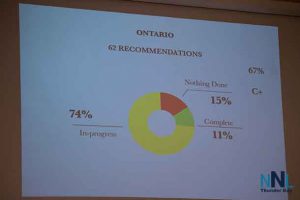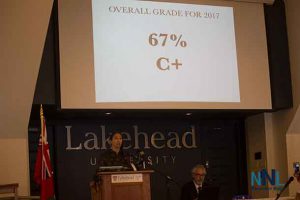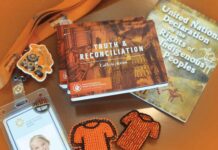Overall Grade of C-
THUNDER BAY – Canada received a grade of “D” from the Aboriginal Legal Services who were in Thunder Bay today to present a progress report on the ongoing progress made toward the jury recommendations in the deaths of Indigenous students in Thunder Bay.
The overall grade for all efforts in the deaths of Jethro Anderson, Reggie Bushie, Robyn Harper, Kyle Morrisseau, Paul Panacheese and Jordan Wabasse was a C+.
“It is very disappointing that after all the work that went into the inquest and all the time the jury spend crafting very thoughtful recommendations that the results in the first year are not very good.”
In addition to providing an overall grade; each of the parties were graded as well. The government of Canada received the lowest mark with a D. The highest grades were achieved by Northern Nishnawbe Education Council and Dennis Franklin Cromarty High School – A-; Matawa Learning Centre – A-: and Keewaytinook Okimakanak – A.
The other parties receiving grades were: The government of Ontario – C+; the City of Thunder Bay – C+; Nishnawbe Aski Nation – C+; and the Thunder Bay Police Services – B+: All grades were based on reports filed by the parties with the Office of Chief Coroner with regard to their progress on meeting the recommendations. A mathematical formula was created to determine the grades. All the material used to compile the grades and the grade calculations can be found at www.aboriginallegal.ca/fny.
The City of Thunder Bay received a “C” and the Thunder Bay Police Service received a grade of “B+”.
Thunder Bay City Manager Norm Gale responded for the city.
The report came out as the senior levels of government put in $10 million toward funding the issues faced by Nishnawbe Aski Nation.
“Today, Nishnawbe Aski Nation (NAN) Grand Chief Alvin Fiddler, Federal Minister of Indigenous and Northern Affairs Minister Carolyn Bennett and Ontario Minister of Education Mitzie Hunter issued the following statement regarding a joint response to the First Nations youth safety crisis in Northern Ontario:
“Our governments are committed to doing all we can to ensure that First Nations students have access to a safe and supportive learning environment, regardless of where they live in the province. Currently, many students living in Northern and remote communities on NAN territory are unable to complete high school on reserve and have to leave their families and communities to obtain a secondary education. In July, NAN requested that a state of emergency be declared in response to a crisis for the safety of Indigenous youth in the city of Thunder Bay. We have heard that students and families do not feel safe leaving their communities and this has resulted in students having to choose between their education, their well-being and safety by remaining on-reserve. This is unacceptable.
“NAN has developed a plan of action to respond to the student safety crisis. The Governments of Canada and Ontario are supporting that plan with a federal investment of $4.67 million annually for the coming three years and a provincial investment of $5.5 million for the 2017-18 school year to address the immediate needs of NAN students. This funding is in addition to specific funding for priority needs for these students that is already in the hands of communities for the September 2017 school year, bringing the total amount of new federal funding for students who leave their communities to $14.3 million. The goal of this funding is to ensure that students will have safe and healthy school choices in an environment that offers culturally relevant and appropriate learning in the immediate term.”
The Thunder Bay Police Service received a grade of ‘B+’.


